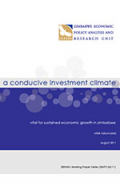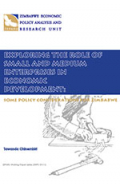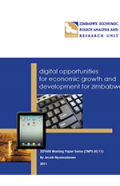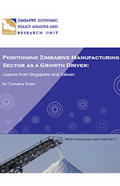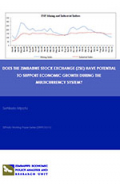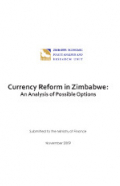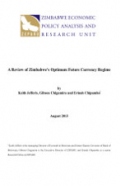This paper analyzes how the investment climate in Zimbabwe can be improved to meaningfully attract foreign direct investment.
Publications
This research focuses on the role of the SME sector in Zimbabwe’s economic development.
The study explores the opportunities for enhancing sustainable economic growth and development in Zimbabwe, through the use of digital innovations.
The paper investigates the preconditions that ought to be satisfied before adopting a single currency in SADC and COMESA regions. A review of the theory of the OCA and a selected review of empirical literature was done. The paper reveals that the divergence in economic conditions for both SADC and COMESA do not favour a single currency
Among the sectors that have been identified and are mostly cited in Zimbabwe as growth drivers are agriculture and mining.
This paper makes an attempt to evaluate the prospects and challenges of the increasing trade and investment relations between Zimbabwe and China & India.
In this paper we examine the potential of the ZSE to promote economic growth during the multicurrency regime in Zimbabwe.
This study looks at the feasibility and rationale of establishing a Debt Management Office (DMO) in Zimbabwe. This follows calls for the setting up of such an office by the Ministry of Finance as part of broad reforms to improve the conduct of debt management in the country.
The paper undertakes to assess and explore ways in which government can expand its fiscal space. The subsequent sections examine the four pillars of enhancing the space, adapting them to facts prevailing in Zimbabwe and explores the ways in which the government can create additional fiscal space will.
Following a period of economic stability under the inclusive government, attention has now shifted to having more investment in growth-enhancing infrastructure in sectors such as power, transport and water sectors. On appreciating its limitations in handling the task, the Government took a stance to adopt public private sector partnerships (PPP), under which the private sector would be called in to partner Government.
Prior to the official adoption of the multi-currency system in January 2009, the economy was characterized by hyperinflation, high & unsustainable budget deficit; a growing balance of payments deficit; dwindling foreign currency reserves, acute foreign exchange shortages, low capacity utilisation; financial disintermediation and shortages of the local currency (Zimbabwe dollars Z$ cash).
The purpose of this paper is to revisit the issue of Zimbabwe’s optimum future currency regime choice in the light of experience in the Zimbabwe economy and developments in Southern African Development Community (SADC) with regard to regional integration, as well as general global experiences with regard to currency regimes.





